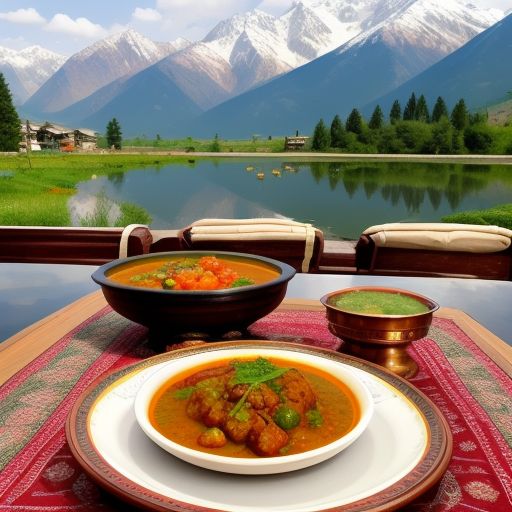Nestled in the picturesque valleys of the Himalayas, Kashmir is not only known for its breathtaking beauty but also its rich and flavorful cuisine. Traditional Kashmiri meals reflect the region’s unique blend of cultural influences, including Central Asian, Persian, and Mughal culinary traditions. From the aromatic Wazwan to the comforting warmth of Yakhni, Kashmiri food is a celebration of flavor, history, and hospitality.
The Essence of Kashmiri Cuisine
Kashmiri cuisine is characterized by its rich use of spices, aromatic flavors, and a variety of cooking techniques. The cuisine is divided into two distinct traditions: the Pandit (Hindu) style, which avoids onions and garlic, and the Muslim style, which incorporates these ingredients generously. The result is a diverse culinary repertoire that caters to a wide range of tastes.
Key spices like saffron, fennel, and dried ginger define Kashmiri meals, while lamb is a staple protein. Rice, grown in the fertile valley, is a central component of most meals, often paired with flavorful gravies and sides.
Iconic Traditional Kashmiri Dishes
Wazwan: The Grand Feast
Wazwan is a multi-course meal that stands as the epitome of Kashmiri hospitality. It includes dishes like Gushtaba (meatballs in a creamy yogurt gravy), Rogan Josh (spiced lamb curry), and Tabak Maaz (fried lamb ribs). This elaborate meal is traditionally served at weddings and special occasions.
Rogan Josh: A Flavorful Curry
This iconic lamb dish is cooked with a blend of Kashmiri red chilies, yogurt, and a medley of spices, giving it its signature vibrant color and rich taste. Rogan Josh is a must-try for anyone exploring Kashmiri cuisine.
Yakhni: Comfort in a Bowl
Yakhni is a delicate yogurt-based curry, often made with lamb or chicken. Its subtle flavors, infused with fennel and cardamom, make it a comforting and satisfying dish.
Dum Aloo: A Vegetarian Delight
This dish features baby potatoes cooked in a tangy and spicy yogurt gravy. Dum Aloo is a favorite among vegetarians and pairs perfectly with steamed rice or naan.
Kahwa: The Soul-Warming Tea
Kahwa is a traditional green tea brewed with saffron, almonds, and cardamom. It is often served during winter and is a staple at Kashmiri gatherings.
Kashmiri Culinary Traditions: A Fusion of Heritage and Hospitality
The origins of Kashmiri cuisine date back to the history and culture of the region. Food in Kashmir is not just an affair of consumerism, they are also an expression of love and hospitality. Traditional Kashmiri meals tend to be quite elaborate and take a lot of time and attention to detail to prepare.
The extravagant Wazwan – a culinary festival that is the centerpiece of Kashmiri dietary tradition – draws on Kashmir’s multitude of cultural influences. The elaborate feast is a family and friends affair: People gather around food and conviviality when they want to celebrate something special. Wazwan is prepared by skilled chefs called Wazas, for whom this preparation is nothing less than an art.
Kashmiri cuisine also highlights the region’s plentiful natural resources. Fresh and high-quality ingredients defining the taste of most Kashmiri dishes are produced in saffron fields, orchards, and rice paddies. From Yakhni’s creamy gravies to Rogan Josh’s vibrant spices, each dish is steeped in a tale of the valley’s harvest.
Kashmiri cooking has always been about slow-cook fires in copper pots, the traditional way of cooking, which, technology notwithstanding, lies at the heart of Kashmiri cooking. These practices afford the kind of flavors that are both profound and true, and result in deep and memorable meals.
How Kashmiri Cuisine Reflects Its Heritage
Kashmiri cuisine is a reflection of the valley’s cultural and historical influences. The use of saffron and dried fruits highlights Persian and Central Asian ties, while the emphasis on lamb dishes reflects Mughal culinary traditions. The harmonious blend of these influences creates a cuisine that is both distinct and representative of Kashmir’s heritage.
FAQs About Traditional Kashmiri Meals
1. What makes Kashmiri cuisine unique?
The use of unique spices like saffron, fennel, and dried ginger, combined with diverse cooking techniques, makes Kashmiri cuisine truly exceptional.
2. What is the significance of Wazwan in Kashmiri culture?
Wazwan is a symbol of Kashmiri hospitality and tradition, often served at weddings and special celebrations.
3. Are Kashmiri meals spicy?
Kashmiri meals are flavorful but not overly spicy, with a focus on aromatic and balanced tastes.
4. Can I find Kashmiri dishes outside the region?
Yes, Kashmiri dishes like Rogan Josh and Yakhni are popular and can be found in restaurants around the world.
5. What role does saffron play in Kashmiri cuisine?
Saffron is a key ingredient in many Kashmiri dishes, adding a distinctive aroma and flavor that elevates the meal.
Conclusion
Traditional Kashmiri meals are a testament to the region’s rich heritage and culinary artistry. From the grandeur of Wazwan to the comforting flavors of Yakhni, Kashmiri cuisine offers a unique and unforgettable dining experience. Exploring these dishes is not just about savoring delicious food but also about connecting with the history and culture of Kashmir.
Experience the magic of Kashmiri cuisine today and discover why it has enchanted food lovers for centuries!


Add a Comment